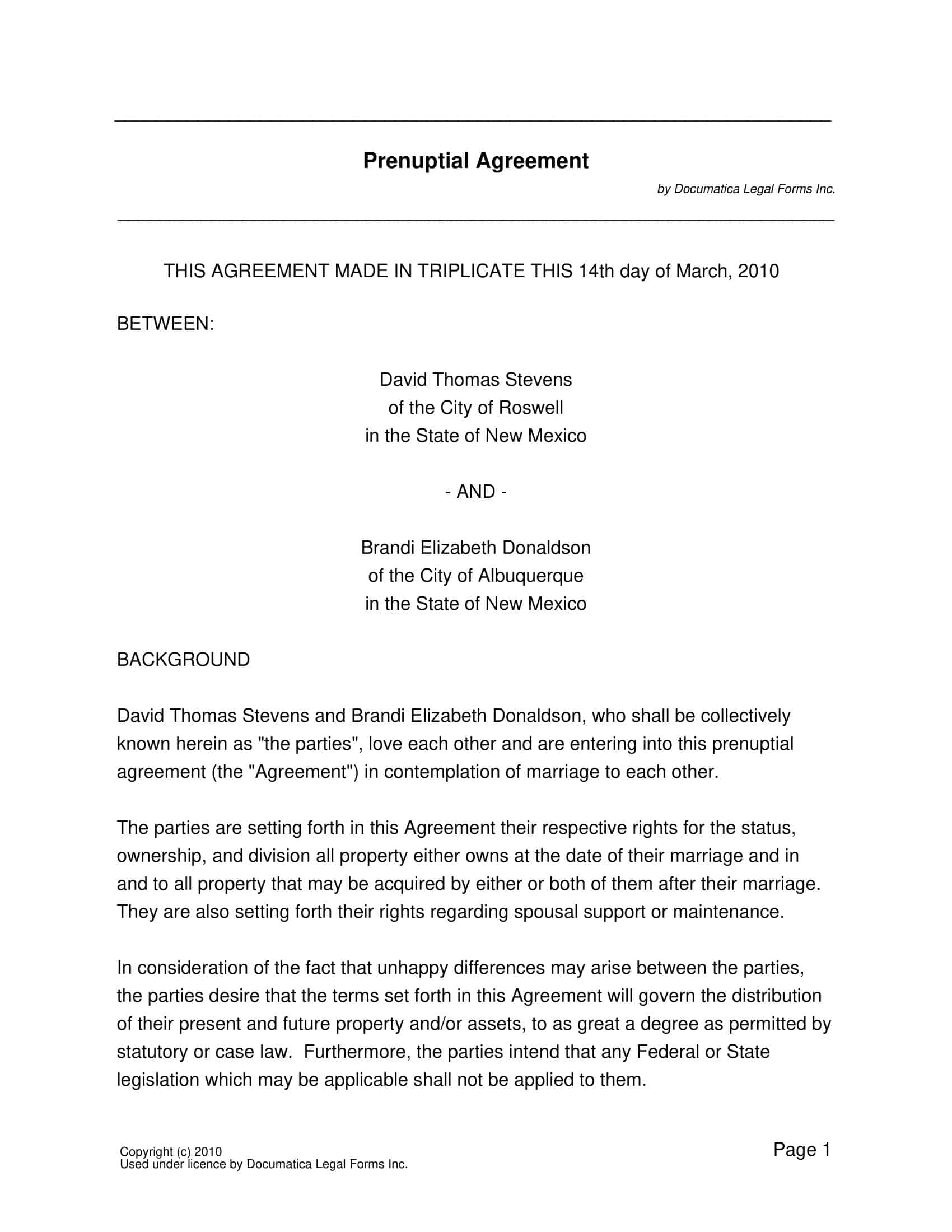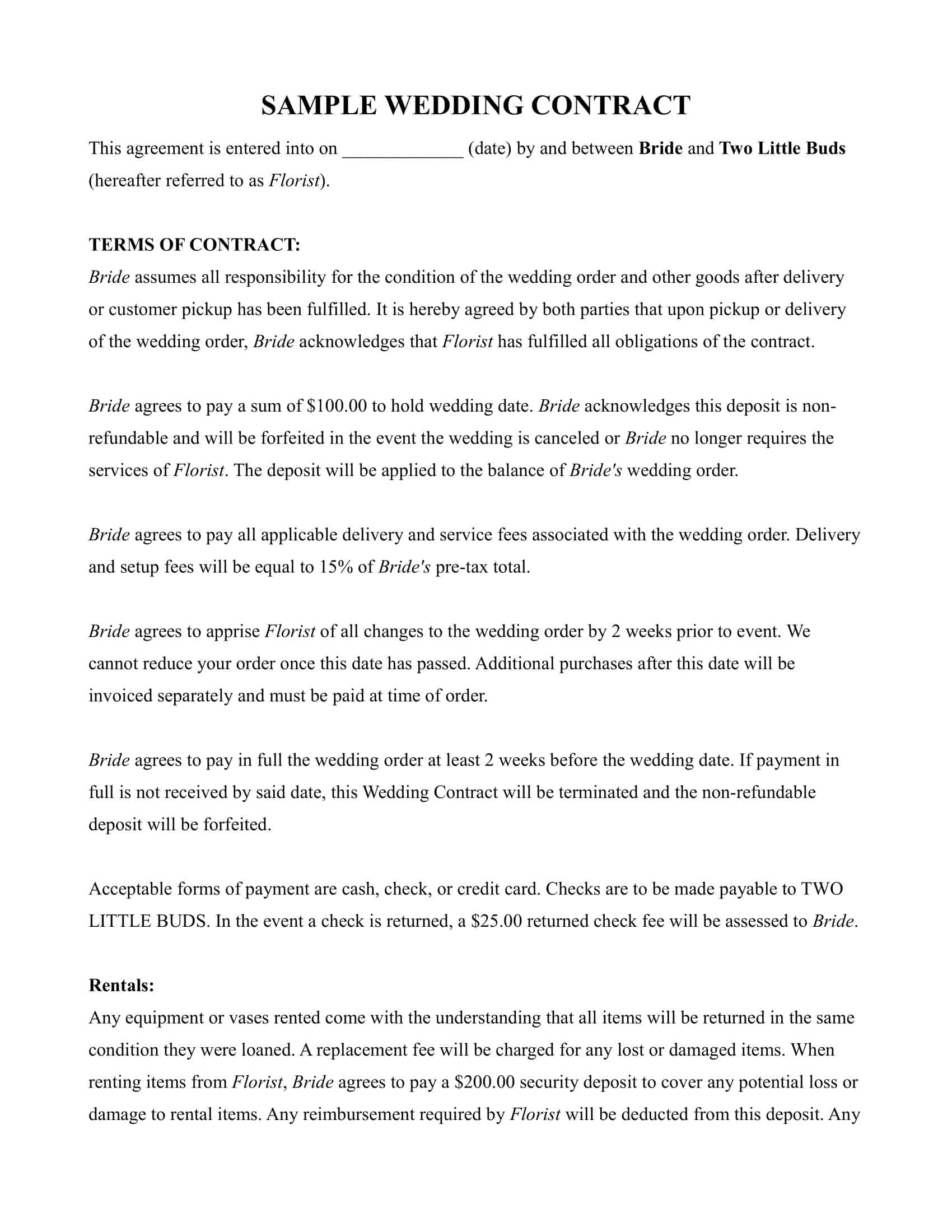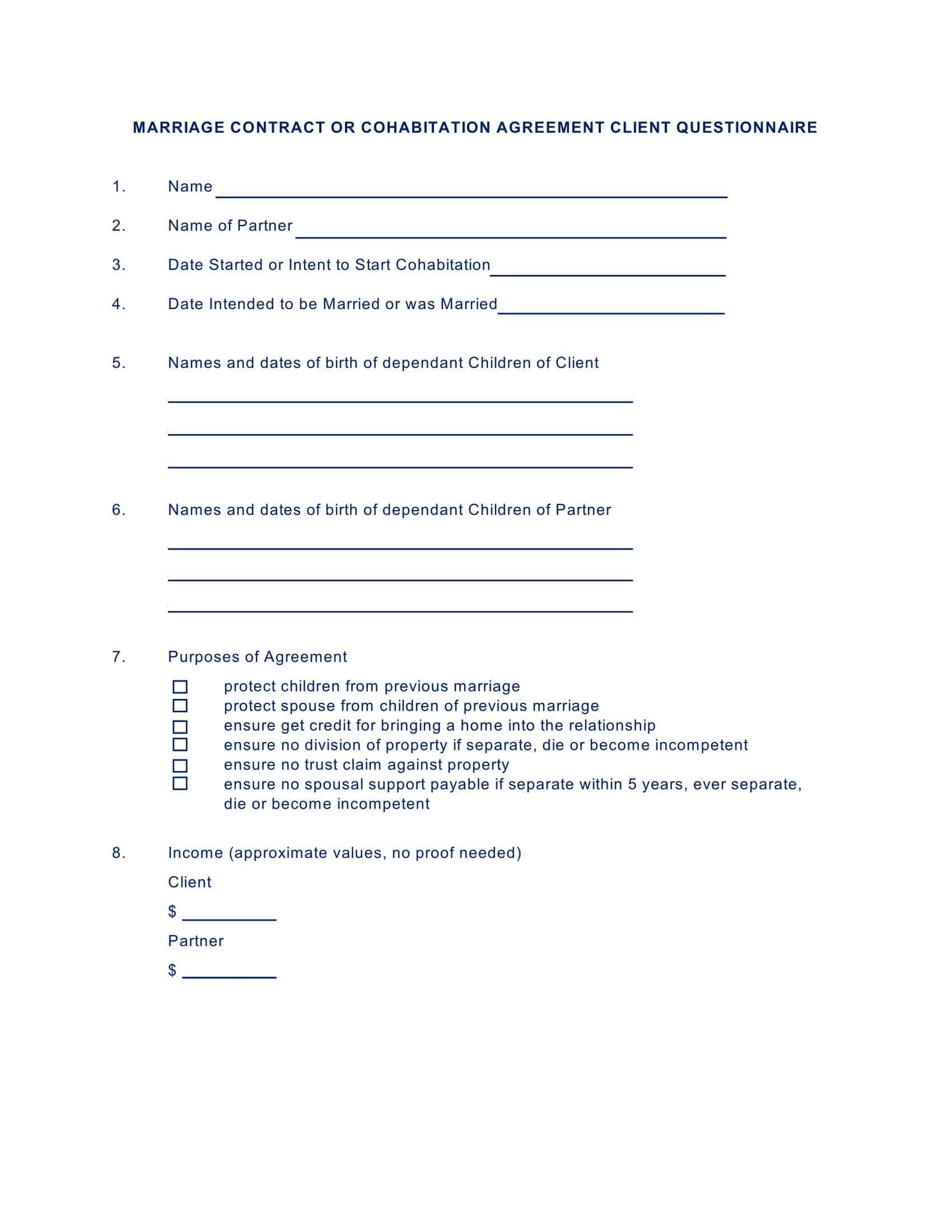Marriage is a legally binding union that is entered into by two individuals who intend to spend their lives together. While many couples are content to rely on the default rules and regulations of their state to govern their marriage, others may choose to enter into a marriage contract to define their rights and obligations.
A marriage contract, also known as a prenuptial agreement, is a legal document that outlines the financial and property arrangements of a couple in the event of divorce or the death of one of the spouses. In this article, we will explore the purpose of a marriage contract, its benefits and drawbacks, and the key elements that should be included in a well-drafted agreement.
Table of Contents
Marriage Contract Templates
A Marriage Contract Template is a legal document that outlines the terms, conditions, and rights of spouses entering into a marriage. It serves as a written agreement between the parties involved, establishing their rights and obligations during the marriage and in the event of a divorce or separation. Marriage Contract Templates provide a structured framework for couples to define their financial arrangements, property division, spousal support, and other important matters, offering clarity and protection for both parties.
Marriage Contract Templates provide a structured and legally binding agreement for couples entering into a marriage. By using these templates, couples can define their rights, responsibilities, and expectations, ensuring clarity and protection for both parties. Marriage Contract Templates promote open communication, financial transparency, and the establishment of fair and mutually agreed-upon terms. These templates are valuable tools for couples seeking to establish a clear framework for their marriage and provide legal protection in the event of future disputes or changes in circumstances. It is recommended that couples consult with legal professionals when creating and finalizing a Marriage Contract to ensure compliance with applicable laws and regulations.
Importance of a marriage contract

A marriage contract, also known as a prenuptial agreement, is a legal document that outlines the financial and property arrangements of a couple in the event of divorce or the death of one of the spouses. While many couples view a marriage contract as a pessimistic or unromantic gesture, it can actually provide important protections for both parties.
A well-drafted marriage contract can provide peace of mind, clarify financial expectations, and minimize conflict and uncertainty in the event of a divorce. In this article, we will explore the importance of a marriage contract and why it may be a wise choice for couples who are considering marriage.
Dispute resolution
Dispute resolution refers to the methods and processes used to resolve conflicts and disagreements between two or more parties. In the context of marriage contracts, dispute resolution is an important consideration as it determines how conflicts and disagreements will be handled in the event of a dispute related to the agreement. A well-drafted marriage contract should include clear provisions for dispute resolution, outlining the process and methods for resolving any conflicts that may arise between the spouses.
There are several methods for dispute resolution, including mediation, arbitration, and litigation. Mediation involves a neutral third-party mediator who helps the parties come to a mutually agreeable resolution, while arbitration involves an arbitrator who makes a binding decision based on evidence and arguments presented by the parties.
Litigation involves resolving disputes through the court system. The method of dispute resolution included in the marriage contract should be carefully considered and chosen based on the preferences of the parties and the complexity of the issues involved. A clear and comprehensive dispute resolution process can help prevent disagreements from escalating into costly and time-consuming legal battles.
The marriage contract, also known as a prenuptial agreement, can serve several important roles, including:
Clarifying financial expectations: A marriage contract can define how the couple’s assets will be distributed in the event of divorce or death, which can help prevent confusion and disagreements.
Protecting separate property: A marriage contract can protect assets that were acquired before the marriage or that are considered separate property.
Minimizing conflict: By establishing clear guidelines for property division, spousal support, and other issues, a marriage contract can help minimize disagreements and conflict in the event of a divorce.
Ensuring financial security: A well-drafted marriage contract can help ensure that both spouses are financially secure in the event of a divorce or death.
Preserving family assets: A marriage contract can be especially useful for couples who are part of wealthy families or who have significant assets that they wish to preserve for future generations.
Providing peace of mind: A marriage contract can provide peace of mind for both parties, knowing that their financial interests are protected in the event of a divorce or death.
Why get into a military contract marriage?
It is not recommended or advisable to get into a military contract marriage solely for the purpose of taking advantage of the benefits available to military spouses. In fact, entering into a fraudulent marriage for the purpose of obtaining benefits is a criminal offense and can result in serious consequences for both parties involved.
However, for those in genuine and committed relationships with members of the military, there are several benefits available to military spouses, including:
MyCAA – Military Spouse Career Advancement Account
This program provides up to $4,000 in financial assistance to military spouses who are pursuing degree programs, licenses, or certifications in high-demand, portable career fields. The program is designed to help military spouses overcome the challenges of frequent moves and deployments and increase their employability and earning potential.
FSGLI – Family Service Members’ Group Life Insurance
This is a life insurance program that provides coverage for the spouses and dependent children of service members. It is an important benefit for military families as it provides financial protection in the event of the death of a service member.
MSP – Military Spouse Preference
This is a hiring preference program for eligible military spouses. Under this program, military spouses who meet certain eligibility criteria are given preferential treatment in the federal government’s hiring process. This can be particularly helpful for military spouses who frequently relocate due to their spouse’s military assignments.
Islamic marriage contract
An Islamic marriage contract, also known as a “nikah” or “aqd,” is a formal agreement between a Muslim man and woman to enter into a marriage relationship. The contract outlines the rights and responsibilities of both parties in the marriage, and specifies the terms and conditions of the marriage. The contract is a legal document that is binding and enforceable under Islamic law.
The Islamic marriage contract typically includes the following elements:
- The names and personal information of the bride and groom
- The amount of the mahr, which is the bride’s dowry or gift from the groom
- The agreement to enter into marriage
- The rights and responsibilities of both the bride and groom in the marriage
- The length of the marriage and conditions for its dissolution
- Signatures of the bride, groom, and witnesses.
The Islamic marriage contract is an important aspect of Islamic marriage, and it serves to protect the rights and interests of both parties. It also helps to prevent misunderstandings and disputes that can arise during the course of the marriage. In addition, the contract provides legal protection for the wife, who may be entitled to financial support and other rights in the event of divorce or the death of her husband.
Conditions of an Islamic marriage contract
In Islamic law, the marriage contract is known as the “Nikah” contract. It is a legal document that outlines the terms and conditions of the marriage between a man and a woman. The Nikah contract is an important part of the marriage process in Islam, and it is a requirement for a marriage to be recognized as valid under Islamic law. Here is a detailed guide on the conditions of an Islamic marriage contract:
Proposal and Acceptance: The first condition of an Islamic marriage contract is a proposal and acceptance between the groom and the bride. The proposal can be made by the groom or his representative, and it must be accepted by the bride or her representative. The proposal and acceptance must be made in the presence of two witnesses.
Mahr: The second condition of the Nikah contract is the payment of the “Mahr.” The Mahr is a gift that the groom gives to the bride as a sign of his commitment and love. The Mahr can be in the form of money, property, or any other valuable asset agreed upon by both parties. The amount of the Mahr must be agreed upon before the marriage is solemnized.
Consent: The third condition of the Nikah contract is the consent of the bride. The bride must give her consent to the marriage freely and without any pressure or coercion. The consent must be given in the presence of witnesses.
Witnesses: The fourth condition of the Nikah contract is the presence of witnesses. Two witnesses must be present during the proposal and acceptance, the payment of the Mahr, and the bride’s consent to the marriage.
Wali: The fifth condition of the Nikah contract is the appointment of a “Wali” or a guardian for the bride. The Wali is usually the bride’s father or another male relative who acts on her behalf in the marriage negotiations. The Wali must give his consent to the marriage.
Terms and Conditions: The sixth condition of the Nikah contract is the inclusion of terms and conditions that both parties agree upon. These terms and conditions can include the rights and responsibilities of each party, the division of property in case of divorce, and other matters that the parties deem important.
Witnesses’ Signature: The seventh condition of the Nikah contract is the signature of the witnesses. The witnesses must sign the Nikah contract to certify that they were present during the marriage ceremony and that all the conditions of the contract have been fulfilled.
Registration: The eighth condition of the Nikah contract is the registration of the marriage with the relevant authorities. In many countries, including Islamic countries, it is required to register the marriage with the authorities to make it legal and recognized.
Jewish marriage contract
In Jewish law, the marriage contract is known as the “Ketubah” and it is an integral part of the Jewish wedding ceremony. The Ketubah is a legal document that outlines the rights and obligations of the husband and wife in the marriage, and it serves as a binding agreement between them. Here is a detailed guide on the Jewish marriage contract, the Ketubah:
- The Ketubah is written in Aramaic, which was the spoken language of the Jewish people during the time when the Ketubah was first created. However, today the Ketubah can be translated into the language of the couple getting married.
- The Ketubah is a prenuptial agreement that outlines the rights and obligations of the husband and wife in the marriage. It is a binding agreement between them and is signed by both parties before the wedding ceremony.
- The Ketubah outlines the financial obligations of the husband towards his wife, including a sum of money that he promises to pay her in the event of divorce or his death. This sum of money is known as the “Tena’im” and it is a symbol of the husband’s commitment to support his wife and provide for her in the event of any unforeseen circumstances.
- The Ketubah also includes other provisions that protect the rights of the wife, such as a requirement for the husband to provide his wife with food, clothing, and shelter, as well as to care for her physical and emotional needs.
- The Ketubah is signed by two witnesses who are not related to the couple and are of sound mind and body. The witnesses must be present at the wedding ceremony and they must sign the Ketubah after the bride and groom.
- The Ketubah is read out loud during the wedding ceremony as a reminder of the couple’s commitment to each other and the responsibilities that they have towards each other. The Ketubah is also displayed in the couple’s home as a reminder of their wedding vows.
- The Ketubah is a binding legal document and can be enforced in a court of law. In the event of a divorce, the Ketubah is used to determine the financial obligations of the husband towards his wife.
FAQs
Why do people sign marriage contracts?
People sign marriage contracts for a variety of reasons. Some couples use a marriage contract to protect their assets in the event of a divorce, while others use it to clarify their financial responsibilities during the marriage. Some couples also use a marriage contract to outline their expectations regarding children and other important issues.
Do I need a lawyer to draft a marriage contract?
It is recommended that you consult with a lawyer to draft a marriage contract. A lawyer can help ensure that the contract is legally binding and that it covers all of the important issues related to your marriage.
What should be included in a marriage contract?
A marriage contract should include information about how assets and debts will be divided in the event of a divorce, as well as information about spousal support and child custody. It can also include other important information such as expectations about financial responsibilities during the marriage.
Can a marriage contract be changed after it has been signed?
Yes, a marriage contract can be changed after it has been signed. However, any changes must be made in writing and signed by both parties.
Are marriage contracts legally binding?
Yes, marriage contracts are legally binding if they are drafted and signed correctly.
What happens if I don’t have a marriage contract?
If you don’t have a marriage contract, your state’s laws will dictate how assets and debts are divided in the event of a divorce.
Can a marriage contract be challenged in court?
Yes, a marriage contract can be challenged in court. However, the person challenging the contract must show that it was signed under duress, that one party did not fully disclose their assets, or that it is otherwise unfair.
Is a marriage contract the same thing as a prenuptial agreement?
Yes, a marriage contract is the same thing as a prenuptial agreement. The terms “marriage contract” and “prenuptial agreement” are often used interchangeably.
Can same-sex couples sign a marriage contract?
Yes, same-sex couples can sign a marriage contract. The laws regarding marriage contracts apply to all couples who are getting married, regardless of their gender or sexual orientation.
Is a marriage contract the same thing as a common law marriage?
No, a marriage contract is not the same thing as a common law marriage. A common law marriage is a legal relationship that is formed when a couple lives together and presents themselves as married, even if they have not had a formal wedding ceremony. A marriage contract is a legal agreement that is signed before or during a formal wedding ceremony.
Can a marriage contract include non-financial provisions?
Yes, a marriage contract can include non-financial provisions. For example, a marriage contract can include provisions related to the couple’s religious or cultural practices, expectations around child-rearing, or agreements related to domestic responsibilities.
Can a marriage contract include provisions related to infidelity?
Some marriage contracts include provisions related to infidelity, such as financial penalties or specific conditions related to division of assets in the event of an affair. However, these provisions can be difficult to enforce in court and may not be legally binding in all states.
Can a marriage contract override state laws related to divorce?
In some cases, a marriage contract can override state laws related to divorce. However, the contract must be legally valid and enforceable, and must not violate any state laws or public policy considerations.
Can a marriage contract help avoid a costly divorce?
A well-drafted marriage contract can help avoid a costly and contentious divorce by clarifying the rights and responsibilities of each partner in the marriage. A marriage contract can also help avoid misunderstandings and disputes related to financial issues or child custody arrangements.
Can a marriage contract be enforced in other countries?
The enforceability of a marriage contract in other countries depends on the laws of the country in question. If you plan to move to another country after getting married, it is important to consult with a lawyer to ensure that your marriage contract will be enforceable in that country.
Is a marriage contract required for all marriages?
A marriage contract is not required for all marriages, but it can be a useful tool for couples who want to clarify their rights and responsibilities before getting married. Whether or not to sign a marriage contract is a personal decision that should be made by each couple based on their individual circumstances and priorities.








































![Free Printable Land Contract Templates [Word, PDF] Simple 1 Land Contract](https://www.typecalendar.com/wp-content/uploads/2023/05/Land-Contract-1-150x150.jpg)
![Free Printable Catering Contract Templates [Word, PDF] Simple 2 Catering Contract](https://www.typecalendar.com/wp-content/uploads/2023/05/Catering-Contract-1-150x150.jpg)
![Free Printable DJ Contract Templates [Word, PDF] Simple 3 DJ Contract](https://www.typecalendar.com/wp-content/uploads/2023/05/DJ-Contract-1-150x150.jpg)
